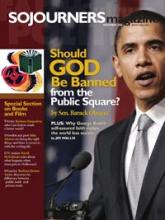As a community of faith, the boundaries of imagination limit us more than anything. Thankfully, imagination also liberates us and carries us—by God’s grace—toward new realities.
This “prophetic imagination,” to use Hebrew Testament scholar Walter Brueggemann’s words, is critical to replacing the corporate media images of the way things supposedly are and will remain with visions of an emerging new world. The necessary “alternative consciousness,” writes Brueggemann in his book The Prophetic Imagination, is both “critical” and “energizing.”
So while critiquing “wars and rumors of wars” (Mark 13:7) in a day when the U.S. minimum wage is as tiny as it’s been in 50 years (when adjusted for inflation), we are energized by the declarative statements of Ruth to her mother-in-law Naomi that “your people shall be my people, and your God my God” (Ruth 1:16), and of Jesus to the disciples that “you shall love your neighbor as yourself” (Mark 12:31, emphasis added).
The forms and styles introducing that alternative consciousness vary through these weeks, from the nurturing conversations of Naomi to the songs of Hannah and the psalmists. Jesus remains both critical (“beware of the scribes!”) and energizing (“the poor widow has put in more”). This is a month to consider our lineage; we are born of a people of faith, yet we’re birthing a world in God’s providential care.
Read the Full Article
